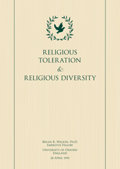No one definitive definition of religion has been accepted by all scholars, but a number of elements, set out in appropriately abstract terms, are frequently invoked in various combinations as the characteristics of religion. They include beliefs, practices, relationships and institutions relative to:
a) supernatural forces, power(s), beings, or goals;
b) man’s ultimate concerns;
c) sacred objects (things set apart and forbidden) of spiritual devotion;
d) an agency that controls man’s destiny;
e) the ground of being;
f) a source of transcendent knowledge or wisdom;
g) the collective character of religious life.
The consequences and functions of religion are indicated as:
a) conferring group and/or individual identity;
b) establishing a framework of orientation;
c) facilitating the creation of a humanly-constructed universe of meaning;
d) providing reassurance and comfort about prospects of help and salvation;
e) effecting human reconciliation and the maintenance of a moral community.
Whilst these features would be generally accepted by scholars as characterizing most if not all religions, they might prove to be too broad to admit of easy application in the practical sphere when, for example, modern governments or judiciaries are faced with the task of applying appropriate criteria to one or another of the many, highly diverse, new or newly-imported religions which now have adherents in western societies. To this end, a more refined catalogue of attributes might be needed, embracing categories each of which is presented not as a sine qua non of religion, but as features often to be found in the empirical evidence about any group which claims for itself the status of a religion. These features, then, are to be regarded, as we have already indicated, as recognizable “family resemblances”. Thus each item is to be seen as something that is probably evident in a religion, without its being suggested that it must be present for a movement or a system of ideas, to qualify as a religion.





























